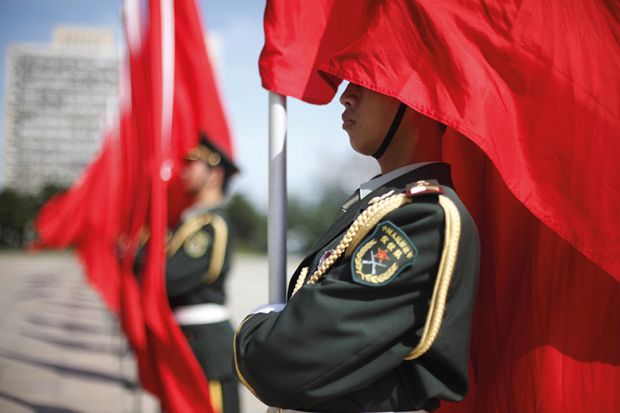“In order to thrive in scientific research, China will have to remain open. You can’t order science to happen: it’s a global affair and it is a global enterprise.”
This view from Marijk van der Wende, distinguished professor of higher education at Utrecht University, addresses the big question mark over China’s potential to dominate research in the decades ahead. Freedom from political constraint and domestic expediency have been accepted prerequisites to progress. But in China, the world has a superpower with a very different model.
Van der Wende’s view that the Chinese government is alive to the integral role that openness plays in world-class research may be reassuring, but it must be counterbalanced by the increasing levels of control the Chinese state is seeking to exert over universities.
There are examples of intervention that the West will welcome: the crackdown on malpractice, for example, in response to high-profile cases such as mass retractions of papers for research fraud, or the swift sacking of a professor who created “gene edited” babies.
But other examples of state oversight, limits on freedom of speech and enquiry, and the increasingly muscular exertion of influence by the Chinese government in general are a worry.
This week, in the second of our two-part analysis of China’s rise to prominence in global higher education, we assess Western universities’ research collaborations in Asia.
Using Australia as a case study, we ask whether the research links that one might expect are developing, assess the major challenges, and consider what might need to change if engagement is to be as meaningful and productive as possible.
For Joseph Siracusa, a professor at RMIT University in Melbourne, the big test in working with authoritarian countries such as China is that “they are not interested in the true, the good and the beautiful…they’re interested in globalisation and how they can move in it a little better.”
This has long been a point of contention in the West, where a truly multidisciplinary approach to academic enquiry has been sacrosanct.
But it must be pointed out that a growing emphasis on STEM – particularly when it comes to public funding – and on measurable research impact is a global phenomenon.
And it seems entirely possible that with its heavy focus on technological advancement, freedom of political speech may not be a necessity for the progress that China is pursuing in specific areas.
After all, Soviet Russia launched the first satellites, and now China has landed a probe on the dark side of the moon. In this regard, at least, it is hard to make the case that progress is being hindered by the fact that the rocket scientists involved are not allowed to question the party.
What these constraints will do is severely curb progress in other areas, and limit the cross-fertilisation of ideas that is a feature of the Western university. It is possible that they will also dissuade some distinguished expats from returning, or foreign academics from moving to China, although the success of the Thousand Talents programme in repatriating researchers from the Chinese diaspora suggests otherwise.
As for the notion that authoritarian governments tend not to be as supportive of blue-sky research as democratic ones, past experience does not necessarily have to colour China’s future – and there’s evidence that developed Western systems are not holding up their end of the bargain at present.
Writing in Times Higher Education last week, Margaret Sheil, vice-chancellor of Queensland University of Technology and former chief executive of the Australian Research Council, spelled out how important this mixed ecology is for a healthy research system.
“A successful national research enterprise must provide the means and the space for all kinds of research to thrive: the applied and the fundamental; the short-cycle and the long-term; the responsive and the speculative. Each has its essential part to play in advancing the collective research agenda, and each depends for its own success on the success of the others,” she said.
This is advice that Asia’s rapidly developing systems would do well to heed, but Sheil’s words were directed not at Beijing but at her own government, with its drift to short-termism, the shocking veto of humanities research projects, and plans for a “national interest test” for ARC-funded work.
So yes, Western research systems must find ways of collaborating for mutual benefit with Asia’s emerging powerhouses. They must also reflect on their own priorities and the example they set.
POSTSCRIPT:
Print headline: Progressing in partnership
Register to continue
Why register?
- Registration is free and only takes a moment
- Once registered, you can read 3 articles a month
- Sign up for our newsletter
Subscribe
Or subscribe for unlimited access to:
- Unlimited access to news, views, insights & reviews
- Digital editions
- Digital access to THE’s university and college rankings analysis
Already registered or a current subscriber?



